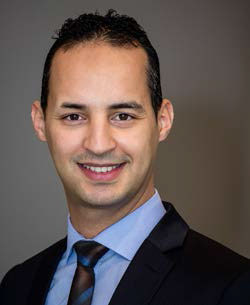Financial partners are key to ATI’s business model. Be it reinsurers or banks, without these important allies, we would not be able to support African governments to the same level – helping to secure preferential loans that translate to improved transparency, providing a pathway to better governance and projects that meet international best practice and governments’ development objectives. This section highlights some of these silent heroes that are vital to ensuring African governments continue to move beyond aid.
In this issue, we feature Swiss Re and their efforts to help provide needed insurance capacity to help Africa become more resilient in the face of natural disasters and events, like the current pandemic.

Pius Leupi

Abdeladim Bousselam
Pius Leupi, Chief Underwriter Credit, Surety & Political Risk and Regional Head EMEA and Abdeladim Bousselam, Senior Underwriter Credit, Surety & Political Risk provide insights into Swiss Re’s impact in the region.
Q: What role does Swiss Re currently play in the reinsurance space in Africa and what are your primary objectives?
Our role in Africa is to be a shock absorber for our clients, so we can build the societal resilience needed to close the protection gap. The Swiss Re Institute estimates that, globally, about 66% of all-natural catastrophe economic losses over the past 10 years were not insured; in Africa, this protection gap is even higher. You may recall Cyclone Idai led to an overall economic loss of USD 2 billion across Mozambique, Malawi and Zimbabwe, of which only 7% was insured; a staggering 93% protection gap. Our primary objective in Africa is to address this immense protection gap to make Africa more resilient.
Q: How much of your business is political and commercial risk insurance and what is the potential to do more?
Our reinsurance book in political and commercial risk insurance has evolved over the years to support our partners. In Africa, we have allocated capacity to cover many projects across the continent where the development impact is real, and we are committed to maintaining our support throughout the cycle.
Q: From your perspective, why is reinsurance important to African economies?
Our industry plays an important role in absorbing some of the pain caused by the disaster, and reinsurance is key to help economies bounce back faster and stronger. But we need to boost insurance penetration if we are going to have a meaningful impact across the continent. According to global benchmarks, developed economies have penetration rates of 7-10% of GDP.
Across the African continent, only South Africa’s insurance penetration is significantly above this threshold, while countries like Namibia, Zimbabwe and Morocco just marginally exceed it. There is enormous potential to create economic and societal resilience across the continent.
Q: How do you work with ATI on transactions in Africa and what is your view of the partnership?
ATI has worked alongside the reinsurance industry to support their member countries attracting investments and capital. As a long-term partner, we work very closely with ATI to support some of their flagship transactions. The complexity of some deals requires leveraging ATI’s existing infrastructure and the strong relationships they enjoy with their member countries. We share ATI’s vision of supporting transactions that positively impact people’s lives and livelihoods for a more resilient and investment-friendly Africa.
Q: What have been the greatest challenges in your ability to reinsure risks in Africa?
The ecosystem required for the good functioning of insurance and partners that are committed for the long-run is key to building a credible and sustainable re/insurance industry.
Q: How have you managed to mitigate the challenges?
The first step is always to acknowledge the specificities of the different countries in Africa. Next, to broaden the scope of insurance coverage, we have committed to a long-term perspective executed through innovative financing solutions such as debt reprofiling.
Considering the countries in the continent with a below-investment-grade credit rating, ATI’s role is a cornerstone in this process.
Q: How has COVID-19 impacted your Africa portfolio, specifically, how has it affected your strategy in the region?
We have a long-term commitment towards Africa, and the pandemic has not changed this. The suffering from the COVID-19 pandemic has been staggering and heartbreaking, with a devastating impact on individuals, families and economies. Swiss Re is committed to supporting clients and partners in the region through our product innovations and thought leadership and by paying covered losses.
Q: What are your predictions for 2021 – what will the reinsurance landscape look like?
The pandemic taught us some hard lessons and exposed societal and economic vulnerabilities around the world. These lessons are likely to shape the future of our industry. Impacts in the way we price and, as an industry, tackle pandemic risk are some of the areas where we should see change. The crisis made it quite evident that the systemic nature and scale of a pandemic like Covid-19 is too heavy a burden for the insurance industry alone. Through public-private partnerships, we have a unique opportunity to build resilience against future pandemics and systemic risks.